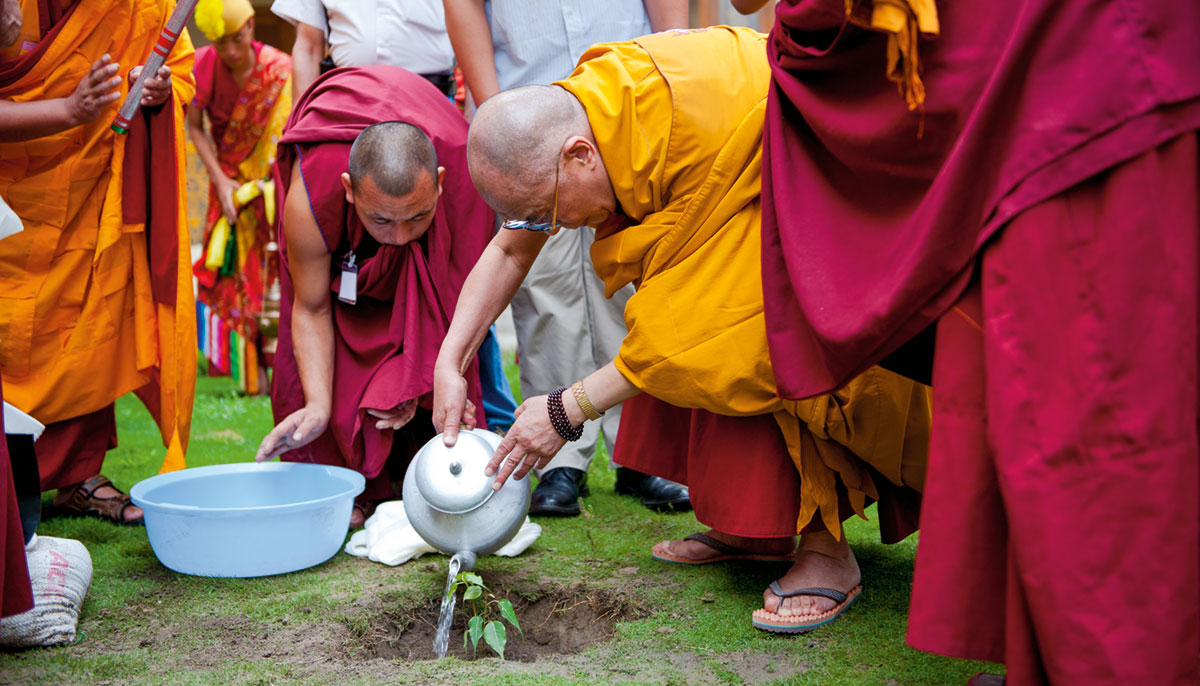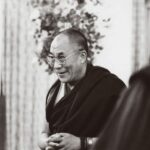Buddha would be green—I am green too
Buddha was born as his mother leaned against a tree for support. He attained enlightenment seated beneath a tree, and passed away as trees stood witness overhead. Therefore, were Buddha to return to our world, he would certainly be connected to the campaign to protect the environment.
Speaking for myself, I have no hesitation in supporting initiatives that are related to protecting the environment because threats to our environment are a question of our survival. This beautiful blue planet is our only home. It provides a habitat for unique and diverse communities. Taking care of our planet is to look after our own home.
We can no longer keep exploiting the resources of this earth—the trees, the water, and the minerals—without any care for coming generations. It is common sense that we cannot survive if we keep working against nature. We must learn to live in harmony with nature.
If we compare damage to the environment to war and violence, it’s clear that violence has an immediate impact on us. The trouble is that damage to the environment takes place more stealthily, so often we don’t see it until it is too late. We have reached a tipping point in global warming.
Environmental education
Environmental education about the consequences of the destruction of our ecosystem and the dramatic decrease in biodiversity must be given top priority. But creating awareness is not sufficient; we must find ways to bring about changes in the way we live. I call on the younger generation—be rebels demanding climate protection and climate justice because it is your future that is at stake.
Simply meditating or praying for change is not enough. There has to be action.
One of the most positive recent developments has been the growing awareness that we have to act. Seventeen-year-old Greta Thunberg, the teenage environmental activist, who insists we heed scientists’ warnings and take direct action, inspires me. Millions of young people have been moved by her example to protest governments’ inaction over the climate crisis. She is correct to say, “No one is too small to make a difference.” I wholeheartedly support “Fridays for Future,” the movement she initiated.
I am encouraged to see young people’s determination to bring about positive change. They are confident of making a difference, because their efforts are based on evidence and reason.
More and more people understand that the survival of humanity is at stake. Simply meditating or praying for change is not enough. There has to be action.
Universal responsibility
We seven billion human beings must learn to live together. It is no longer enough to think only of “my country,” “my people,” “us,” and “them.” We must each learn to work for the benefit of all human beings.
We are social animals born with a sense of belonging to a community. We have to realize that just as our future depends on others, theirs depends on us. Our world is deeply interdependent, not only in terms of our economies but also in facing the challenge of climate change.
We have to appreciate that local problems have global ramifications from the moment they begin. The climate crisis affects the whole of humanity.
Island states like Fiji, the Marshall Islands, the Maldives, and the Bahamas have shown that collectively we can make a difference. The 2015 Paris Agreement to combat climate change signed by 196 countries was a good start that has to be followed through with action.
We need a sense of universal responsibility as our central motivation to rebalance our relations with the environment and with our neighbors. Appreciating the oneness of humanity in the face of the challenge of global warming is the real key to our survival.
The revolution of compassion
I am now eighty-five years old and have lived through many of the upheavals of the twentieth century—the destruction and suffering brought by war, but also unprecedented damage to the natural environment. Today’s younger generation has the ability and opportunity to create a more compassionate world. I urge them to make this twenty-first century an era of change rooted in dialogue and a century of compassion for all the inhabitants of this planet.
Over-exploitation of our natural resources results from ignorance and greed, and a lack of respect for life on earth. Saving the world from the climate crisis is our common responsibility. We must find ways to exercise freedom with responsibility.
We need a revolution of compassion based on warm-heartedness that will contribute to a more compassionate world with a sense of oneness of humanity. The entire human family must unite and cooperate to protect our common home. I hope that efforts to achieve a more sustainable way of life will meet with success.
From Our Only Home: A Climate Appeal to the World

